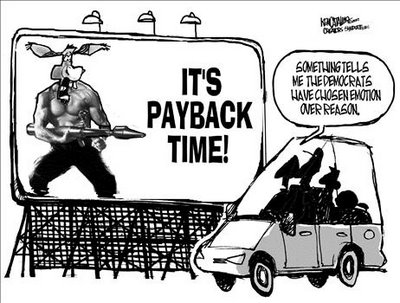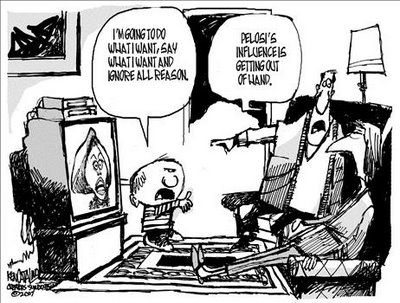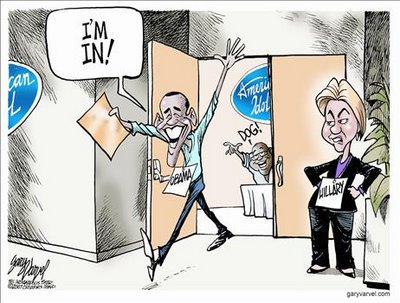
Charles Krauthammer has an interesting article today:
A Plausible Plan B for IraqHe has little faith in the government of Iraqi President Nouri al-Maliki and his Shiite coalition, and believes the surge is unlikely to succeed because of them.
But rather than just whine about it, he has a suggestion for a plan B, that could be used both as an insentive to make Nouri al-Maliki keep his promises, and as an option to switch to if the surge fails. The crux of it is thus:
[...] What is missing is a fourth alternative, both as a threat to Maliki and as an actual fallback if the surge fails. The Pentagon should be working on a sustainable Plan B whose major element would be not so much a drawdown of troops as a drawdown of risk to our troops. If we had zero American casualties a day, there would be as little need to withdraw from Iraq as there is to withdraw from the Balkans.
We need to find a redeployment strategy that maintains as much latent American strength as possible, but with minimal exposure. We say to Maliki: you let us down and we dismantle the Green Zone, leave Baghdad and let you fend for yourself; we keep the airport and certain strategic bases in the area; we redeploy most of our forces to Kurdistan; we maintain a significant presence in Anbar province where we are having success in our one-front war against al-Qaeda and the Baathists. Then we watch. You can have your Baghdad civil war without us. We will be around to pick up the pieces as best we can. [...]
(bold emphasis mine) It's worth reading the whole article, it's not very long and displays a good understanding of the forces at work there, the weaknesses in the surge strategy and how they can be averted.
 (You can read Cox & Forkum's related commentary and links HERE.)
(You can read Cox & Forkum's related commentary and links HERE.)The Democrats have been repeatedly asked to come up with a plan of their own for Iraq; they have repeatedly failed to do so. Yet they continue at rail against all that we do, which demoralises our troops, undermines our efforts and emboldens our enemies. In the long run, I have to wonder which will be more deadly to our troops; roadside bombs, or our Democrat controled Congress? The latter encourages the former.
 Related Links:
Related Links:From Thomas Sowell:
Another Vietnam?There are similarities with Vietnam, but they aren't the ones the Left wants us to believe:
[...] Only after Congress cut off financial support for South Vietnam, while the North Vietnamese continued to get support from the Communist bloc, did South Vietnam fall.
Since then, even the Communist conquerors have admitted that they did not win on the battlefield, but in the American media and in the American political arena, surrounded by an atmosphere created by a defeatist media.
Most of the today's media, led by the New York Times, has been even more blatantly one-sided in their reporting. Everyone I have heard from in person who has actually been in Iraq paints a far different picture from that of the gloom and doom of the media.
Make no mistake about it, we can still lose this war, but it will have to be lost politically. Most of the tragic chaos in Iraq today has its origins in politics. [...]
And he backs that assertion up with concrete examples, that go far in explaining how we have gotten to where we are now. There can be no Democracy without law and order. Thus our choice is clear:
[...] Our choice may become whether we are prepared to sacrifice more American lives in order to prop up the Maliki government or whether we are prepared to sacrifice the Maliki government in order to restore law and order in Iraq. [...]
This is why I think Krauthammer's plan B may be necessary. Law and order WILL have to come first, before real progress can be made. If Maliki is an impediment to that law and order, he should have to fend for himself.
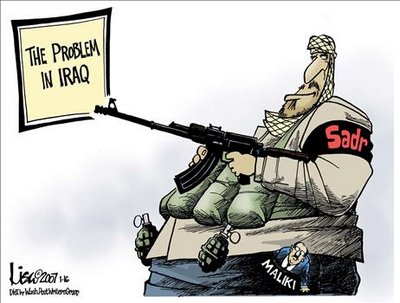 Another Vietnam? Part II
Another Vietnam? Part II[...] President Bush was right to listen to the military as regards the conduct of the war. But perhaps he should have sought the advice of police chiefs as regards maintaining law and order.
For that we did not have enough troops in Iraq and -- more important -- the troops we did have were under too many politically imposed restrictions. Put bluntly, they needed to tell the many private militias in Iraq to drop their guns or get killed.
Far fewer people would have died if they had. Of course, hand-wringers around the world, beginning with the American media, would have denounced such "brutality" and claimed that "negotiations" could have prevented such bloodshed.
The Iraqi government has negotiated, if not collaborated, with some of these domestic terrorists -- and the net result has been escalating violence and mounting death tolls. [...]
Mistakes are made in every war. Do we learn from them, or just give up? My biggest concern when this started was that the MSM would rail against the war with such force, anything short of instant success -an impossibility- would pronounced as complete and utter failure, and the pressure to withdrawl would intesify.
An old Arab proverb says:
"Patience demolishes mountains" Do we have that patience? Do we have ANY patience?
[...] The most fundamental difference between President Bush and his critics has not been in who has made mistakes, because both have. The biggest difference has been that the President has taken a long-run view of the worldwide war on terror, while his critics are seeking a quick fix.
Critics claim that there is no connection between the war on terror and the war in Iraq. They don't seem to notice that the terrorists themselves obviously see a clear connection, which they express in both words and deeds. [...]
We'd all like a quick fix. But when war is declared against you, the only choice you are given is to surrender or fight. And fighting means you fight till you defeat your enemy, however long it takes.

Our enemies think we are a weak and decadent "instant this, instant that" culture; that if we can't have success quickly, we will just give up. If that is the message we send them now... well, our difficulties now will look like nothing compared to what lies ahead.
Thomas wraps it all up with what's at stake. Both articles are short and to the point, and well worth the read.
 I've recently begun using the newest upgrade of Firefox, version 2.0.0.1. I like it a lot!
I've recently begun using the newest upgrade of Firefox, version 2.0.0.1. I like it a lot!





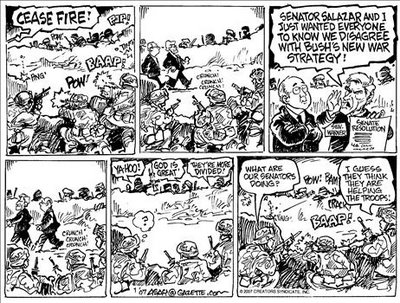














 Dick Cheney blew his stack in an interview with Wolf Blitzer
Dick Cheney blew his stack in an interview with Wolf Blitzer




